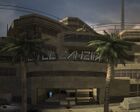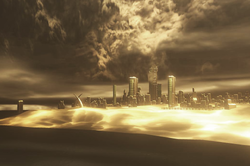Old Mombasa: Difference between revisions
From Halopedia, the Halo wiki
m (→Locales) |
TDSpiral94 (talk | contribs) No edit summary |
||
| Line 2: | Line 2: | ||
{{Ratings}} | {{Ratings}} | ||
[[ | |||
[[File:OldMombasaSkyline.png|thumb|250px|The skyline of Old Mombasa]] | |||
'''Old Mombasa''' is the older, more run-down sector in [[Mombasa]], [[Republic of Kenya|Kenya]] on [[Earth]]. It is located across Kilindini Harbor on the [[Africa|African mainland]], altough all municipalities within a 74 km radius of the island are now referred to as Old Mombasa. While [[New Mombasa]] was a dynamic, cosmopolitan city, Old Mombasa was much more dilapidated. | '''Old Mombasa''' is the older, more run-down sector in [[Mombasa]], [[Republic of Kenya|Kenya]] on [[Earth]]. It is located across Kilindini Harbor on the [[Africa|African mainland]], altough all municipalities within a 74 km radius of the island are now referred to as Old Mombasa. While [[New Mombasa]] was a dynamic, cosmopolitan city, Old Mombasa was much more dilapidated. | ||
== History == | == History == | ||
[[Image:Hotelz2rw.jpg|left|thumb|140px|[[Hotel Zanzibar]] in Old Mombasa.]] | [[Image:Hotelz2rw.jpg|left|thumb|140px|[[Hotel Zanzibar]] in Old Mombasa.]] | ||
The mainland districts were stifled, ironically, by their thirst for growth. During the 21st and 22nd centuries, sea levels worldwide began rising due to global warming. Port cities around the planet were faced with a choice: construct flood control measures, or drown. In Mombasa, it was decided that, rather than shore up the old docks on Mombasa Island, it would be easier to build brand new ports on the mainland, southwest of the city. So massive seawalls were built to hold back the rising waters, and new dock structures extended out into Kilindini Harbor. | The mainland districts were stifled, ironically, by their thirst for growth. During the 21st and 22nd centuries, sea levels worldwide began rising due to global warming. Port cities around the planet were faced with a choice: construct flood control measures, or drown. In Mombasa, it was decided that, rather than shore up the old docks on Mombasa Island, it would be easier to build brand new ports on the mainland, southwest of the city. So massive seawalls were built to hold back the rising waters, and new dock structures extended out into Kilindini Harbor. | ||
[[Image: | |||
[[Image:Turf.PNG|thumb|250 px|right|The multiplayer map Turf, showcasing the architecture of Old Mombasa.]] | |||
For a time, these docks brought prosperity to the mainland. Shantytowns were demolished to make way for new office buildings, highways were constructed, and commerce thrived. But by the end of the 23rd century, global warming began to reverse as new technologies emerged and millions of people departed Earth for colonies in the rest of the UNSC-controlled space. Sea levels began receding as temperatures dropped worldwide. In time, the port facilities on the mainland were left literally high and dry. | For a time, these docks brought prosperity to the mainland. Shantytowns were demolished to make way for new office buildings, highways were constructed, and commerce thrived. But by the end of the 23rd century, global warming began to reverse as new technologies emerged and millions of people departed Earth for colonies in the rest of the UNSC-controlled space. Sea levels began receding as temperatures dropped worldwide. In time, the port facilities on the mainland were left literally high and dry. | ||
Unfortunately, interstellar travel was discovered just as the mainland's ports became useless. In the dawn of the 24th century, Mombasa was chosen to be Earth's first [[Space Elevator|tether]] city. As a result, the [[New Mombasa Orbital Elevator]] and its attendant port system was constructed on Mombasa Island. Consequently, the island-city transformed into the hi-tech metropolis of New Mombasa, while the mainland area languished, closed off behind its useless seawall. | Unfortunately, interstellar travel was discovered just as the mainland's ports became useless. In the dawn of the 24th century, Mombasa was chosen to be Earth's first [[Space Elevator|tether]] city. As a result, the [[New Mombasa Orbital Elevator]] and its attendant port system was constructed on Mombasa Island. Consequently, the island-city transformed into the hi-tech metropolis of New Mombasa, while the mainland area languished, closed off behind its useless seawall. | ||
[[File:Longshorepic.jpg|thumb|right|200px|A [[Longshore (Level)|port]] in Old Mombasa.]] | [[File:Longshorepic.jpg|thumb|right|200px|A [[Longshore (Level)|port]] in Old Mombasa.]] | ||
By [[2552]], Old Mombasa, as the mainland came to be called, had remained much the same. Its architecture is an odd hodgepodge of old and new: 16th-century Muslim arcades, ageing 21st-century office buildings, looming 26th-century power couplings. Old concrete homes secured with computerized locks. Clotheslines strung next to power lines. Mechanical gates set into ancient brick walls. The culture also seems displaced; while New Mombasa is populated with industrial workers and ambitious cosmopolitans, Old Mombasa is considered to be more of a slum. The residents of Old Mombasa even spoke their own dialect, indicating their isolation.<ref>Second Sunrise Over New Mombasa, [[Halo Graphic Novel]]</ref> | By [[2552]], Old Mombasa, as the mainland came to be called, had remained much the same. Its architecture is an odd hodgepodge of old and new: 16th-century Muslim arcades, ageing 21st-century office buildings, looming 26th-century power couplings. Old concrete homes secured with computerized locks. Clotheslines strung next to power lines. Mechanical gates set into ancient brick walls. The culture also seems displaced; while New Mombasa is populated with industrial workers and ambitious cosmopolitans, Old Mombasa is considered to be more of a slum. The residents of Old Mombasa even spoke their own dialect, indicating their isolation.<ref>Second Sunrise Over New Mombasa, [[Halo Graphic Novel]]</ref> | ||
| Line 21: | Line 26: | ||
== Locales == | == Locales == | ||
[[File:Mombasa tusks.jpg|thumb|right|Tusk-shaped archway similar to a pair present in modern-day [http://en.wikipedia.org/wiki/File:Tusks_in_City_of_Mombasa.jpg Mombasa].]] | [[File:Mombasa tusks.jpg|thumb|right|Tusk-shaped archway similar to a pair present in modern-day [http://en.wikipedia.org/wiki/File:Tusks_in_City_of_Mombasa.jpg Mombasa].]] | ||
*[[Grid Kilo 23]] | *[[Grid Kilo 23]] | ||
Revision as of 01:10, October 18, 2009
Old Mombasa is the older, more run-down sector in Mombasa, Kenya on Earth. It is located across Kilindini Harbor on the African mainland, altough all municipalities within a 74 km radius of the island are now referred to as Old Mombasa. While New Mombasa was a dynamic, cosmopolitan city, Old Mombasa was much more dilapidated.
History

The mainland districts were stifled, ironically, by their thirst for growth. During the 21st and 22nd centuries, sea levels worldwide began rising due to global warming. Port cities around the planet were faced with a choice: construct flood control measures, or drown. In Mombasa, it was decided that, rather than shore up the old docks on Mombasa Island, it would be easier to build brand new ports on the mainland, southwest of the city. So massive seawalls were built to hold back the rising waters, and new dock structures extended out into Kilindini Harbor.
For a time, these docks brought prosperity to the mainland. Shantytowns were demolished to make way for new office buildings, highways were constructed, and commerce thrived. But by the end of the 23rd century, global warming began to reverse as new technologies emerged and millions of people departed Earth for colonies in the rest of the UNSC-controlled space. Sea levels began receding as temperatures dropped worldwide. In time, the port facilities on the mainland were left literally high and dry.
Unfortunately, interstellar travel was discovered just as the mainland's ports became useless. In the dawn of the 24th century, Mombasa was chosen to be Earth's first tether city. As a result, the New Mombasa Orbital Elevator and its attendant port system was constructed on Mombasa Island. Consequently, the island-city transformed into the hi-tech metropolis of New Mombasa, while the mainland area languished, closed off behind its useless seawall.
By 2552, Old Mombasa, as the mainland came to be called, had remained much the same. Its architecture is an odd hodgepodge of old and new: 16th-century Muslim arcades, ageing 21st-century office buildings, looming 26th-century power couplings. Old concrete homes secured with computerized locks. Clotheslines strung next to power lines. Mechanical gates set into ancient brick walls. The culture also seems displaced; while New Mombasa is populated with industrial workers and ambitious cosmopolitans, Old Mombasa is considered to be more of a slum. The residents of Old Mombasa even spoke their own dialect, indicating their isolation.[1]
The Battle of Old Mombasa
During the First Battle of Mombasa, SPARTAN-117s Pelican was shot down by a Covenant Scarab, and crash-landed in Old Mombasa Sector 0-5. The level Outskirts starts at this point. Throughout the rest of the mission, the Chief, accompanied by Sergeant Johnson and a number of UNSC Marines, fights through the slums of the old city, to the Hotel Zanzibar, out onto the beaches, and finally to the underground highway system that connects the city to New Mombasa (Metropolis).
Locales
Links
Sources
- ^ Second Sunrise Over New Mombasa, Halo Graphic Novel
